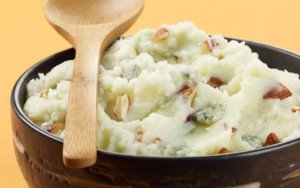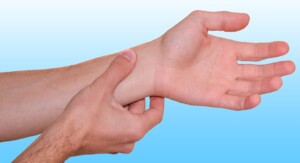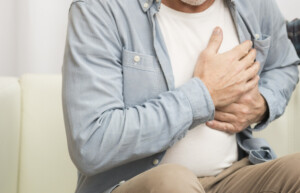It may happen soon after a big meal or a few hours after: a racing heart well over 100 beats per minute and lots of anxiety.
You may have connected the dots early on, or it may have taken awhile, but you now know it for sure:
There is something about eating a heavy meal – whether carb loaded or fat rich – that ridiculously speeds up your pulse and leaves you full of anxiety.
Initially, the anxiety is not from worrying why your heart rate is going at warp speed. In fact, you typically begin feeling anxious but do not know why.
And then you realize that your heart is speeding away like a freight train.
These two symptoms are quite noticeable you’re at rest, such as using a computer or watching TV.
And not long before, you had devoured a ton of carbs. Maybe there was some fat in there too.

Postprandial Tachycardia: Heart Races Soon After Eating a Lot of Food
“Postprandial tachycardia simply means a rapid heart rate after eating,” says Morton Tavel, MD, Clinical Professor Emeritus of Medicine, Indiana University School of Medicine, and author of “Health Tips, Myths, and Tricks: A PHYSICIAN’S ADVICE.”
Dr. Tavel explains, “The type of ‘tachycardia’ described is usually called ‘sinus tachycardia,’ which refers to the ordinary type of rapid heart rates that exceed 100 beats/minute and accompanies such mundane activities as exercise and anxiety.
“After eating a meal, the heart rate may increase a bit in response to the stress imposed by a large meal because digestion demands about a 30% increase of cardiac output, but seldom does the heart rate rise to exceed 100/min.”
Heart Rate Exceeds 100 Beats Per Minute After Eating a Heavy Meal

However, for some individuals, their heart rate soars over 100, even 120 beats per minute.
Are these out of shape, sedentary people who smoke and drink and wouldn’t know a green salad if it smacked them in the face?
Actually, according to a Fitbit thread, there’s a lot of postprandial tachycardia going around among avid exercisers – and well over a hundred beats a minute.
It’s not that exercise enthusiasts are prone to this situation.
But rather, they are more likely to be very aware of what’s going on with their bodies – more in tune with their vitals – than would be a person who’s not health-conscious. They are more likely to notice something unusual.
In addition to the pulse speeding up to conduct the work of digestion, a few other things are going on.
When you eat a lot at one sitting, there’s usually a high amount of carbs. A lot of calories at once, regardless of macronutrient ratios, will make the heart work harder to support the digestive process.
But a whopping slug of carbohydrates will shoot up the blood sugar levels. This triggers insulin production from the pancreas to shuttle the blood sugar (glucose) to muscle cells – for their fuel.
The pancreas may overreact to a big meal by secreting too much insulin. This results in glucose levels that are lower than desirable.
For some individuals, even fitness enthusiasts, their glucose level may dip low enough to change the hormonal environment of the body.
Stress hormones are released. These fire up the sympathetic nervous system. This is the same system that’s stimulated when you’re faced with a perceived threat: the fight or flight response.
- The “threat” may be a true threat such as hearing a window in your house suddenly shatter in the middle of the night.
- Or, it may be your boss at work – who has it in for you – summoning you to his office.
When the body shifts into fight or flight mode, the heart rate accelerates, senses are heightened, blood pressure rises and there’s that edgy feeling of suspense.
These responses help prepare the body for a fight or escape from danger.
This cascade of hormonal reactions to the initial insult of all that blood sugar result in two very noticeable symptoms: a very elevated heart rate and an edge-of-the-seat anxiety.
What to Do if Big Meals Make Your Heart Race Like a Thoroughbred
“It is possible that in rare instances, meals may trigger ‘ectopic’ tachycardias, which are abnormal forms of heart rhythm disorders,” says Dr. Tavel.
“And if heart rates are excessively fast, say, greater than 120, one should seek specialized care from a physician versed in cardiac conditions.”
Next time your heart rate blasts out of orbit after chowing down a large amount of food, calmly feel your pulse.
Though it’s very fast, is it a steady fast or does it seem to be erratic and unable to make up its mind?
Other symptoms such as faintness or chest pain?
A steady pulse in the absence of other physical symptoms is more reassuring than an erratic heartbeat, especially with other symptoms.
Nevertheless, even if your heart rate gradually calms down in a predictable way at some point after eating, you should mention this to a cardiologist just to be sure you are doing quite fine.
The anxiety, though caused by the activation of the sympathetic nervous system, is also reinforced by the realization that your heart rate is way over 100.
Next time you’re in the mood to gorge on more food than you need at one sitting, practice portion control.







































